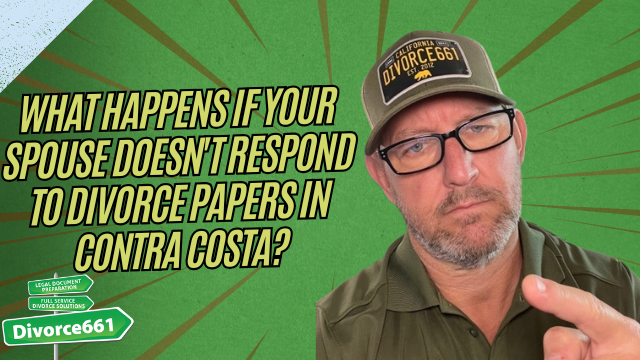What Happens if Your Spouse Doesn’t Respond to Divorce Papers in Contra Costa?
I’m Tim Blankenship from Divorce661. If your spouse was served with divorce papers and doesn’t respond, you don’t have to wait forever—California law allows you to move forward through a default process. Below I explain how default divorce works in Contra Costa County, what paperwork is required, common misconceptions to avoid, and what steps you should take next.
Overview: The 30-Day Deadline and Default
When your spouse is properly served with divorce papers, they generally have 30 days to file a response. If they don’t respond within that time, you can request a default. A default lets the court proceed without your spouse’s input, but it’s not an automatic win—you still must present a complete and fair package of documents for the court to review.
Key point:
- The 30-day window is the trigger for default procedures—don’t assume silence equals automatic approval.
- Default allows the court to enter orders without the other party’s active participation.
What You Must File for a Default Divorce
Filing for default isn’t just filing a single form. Courts expect a complete judgment package that shows the settlement is fair and legally sufficient. The essentials include:
- Request for Default — a form showing the other party failed to respond within the deadline.
- Judgment or Proposed Judgment — the orders you want the court to sign (property division, support, custody, etc.).
- Financial Disclosures — accurate income and asset information so the court can evaluate fairness.
- Supporting Declarations and Exhibits — documentation of service, asset lists, and any other evidence supporting your proposals.
If any of these pieces are missing or incomplete, the court may delay approval or require corrections—meaning your case can sit unresolved for months.
Why the Court Still Reviews Your Package Carefully
Even when one spouse is silent, the judge’s role is to ensure justice and fairness. The court will scrutinize your judgment package to make sure:
- The settlement is just and equitable.
- Financial disclosures are accurate and complete.
- Any requests for child or spousal support follow California law and guidelines.
Silence from the other party does not remove the court’s duty to protect legal rights—especially when children or significant assets are involved.
Common Misconception: Divorce Finalizes Automatically After Six Months
A frequent mistake people make is assuming their divorce is final six months after filing. That’s not how it works. The six-month waiting period in California relates to the earliest time a divorce can be finalized, but you still must take active steps:
- Request default after the 30-day response period passes.
- File the complete judgment package and any required declarations.
- Follow up with the court if additional paperwork is requested.
One client waited months thinking the court would finalize her divorce automatically—when she hired us, we discovered missing forms. Once we filed the complete default paperwork and judgment package, her divorce was approved within a few weeks.
How Divorce661 Can Help
We handle default divorce cases in Contra Costa County from start to finish. That includes preparing and filing the request for default, assembling the judgment package, ensuring financial disclosures are accurate, and addressing any follow-up the court requires.
- Flat-fee pricing—no surprise costs.
- 100% online service—no court appearances required for most cases.
- Fast, court-compliant filings designed to avoid delays.
Step-by-Step Actions If Your Spouse Doesn’t Respond
- Confirm the service was completed and document the date your spouse was served.
- Wait 30 days from the date of service for a response.
- If no response is filed, prepare and file a Request for Default.
- Assemble a complete judgment package with proposed orders and financial disclosures.
- File the judgment package and monitor the court for any requests or hearing dates.
- If the court requests additional documentation, respond promptly to avoid delays.
Real Client Example
“One client thought her divorce would finalize automatically after six months. It didn’t. Once she hired us, we filed her default paperwork and judgment package, and her divorce was finalized in just a few weeks.”
This is a common scenario: well-intentioned people wait and assume the system will finish the process for them. Courts require specific filings and documentation. Missing forms mean delays—sometimes significant ones.
Ready to Move Forward?
If your spouse hasn’t responded and you want to finalize your divorce correctly and quickly, schedule a free consultation with us. We’ll review your situation, prepare the required default forms, and file the judgment package in a way that maximizes the chance of prompt approval.
Visit Divorce661.com or call for a free consultation. Take action now so you can move forward with confidence.
Keywords:
default divorce, Contra Costa divorce, no response divorce, flat-fee divorce, online divorce, California divorce, divorce help

